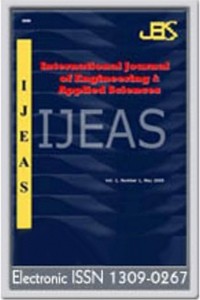Optimisation of Refrigeration System with Two-Stage and Intercooler Using Fuzzy Logic and Genetic Algorithm
Two-stage compression operation prevents excessive compressor outlet pressure and temperature and this operation provides more efficient working condition in low-temperature refrigeration applications. Vapor compression refrigeration system with two-stage and intercooler is very good solution for low-temperature refrigeration applications. In this study, refrigeration system with two-stage and intercooler were optimized using fuzzy logic and genetic algorithm. The necessary thermodynamic characteristics for optimization were estimated with Fuzzy Logic and liquid phase enthalpy, vapour phase enthalpy, liquid phase entropy, vapour phase entropy values were compared with actual values. As a result, optimum working condition of system was estimated by the Genetic Algorithm as -6.0449 oC for evaporator temperature, 25.0115 oC for condenser temperature and 5.9666 for COP. Morever, irreversibility values of the refrigeration system are calculated.
Keywords:
Optimisation, Refrigeration System, COP, Genetic Algorithm Fuzzy Logic,
___
- [1] Mohanraja, M., Jayaraj, S., Muraleedharan, C., Applications of artificial neural networks for refrigeration. Air-conditioning and heat pump systems—A review. Renewable and Sustainable Energy Reviews, 16, 1340-1358, 2012.
- [2] Zhao, L., Cai, W., Ding, X., Chang L., Model-based optimization for vapor compression refrigeration cycle. Energy, 55, 392-402, 2013.
- [3] Sanaye, S., Asgari, H., Thermal modeling of gas engine driven air to water heat pump systems in heating mode using genetic algorithm and Artificial Neural Network methods. International Journal of Refrigeration, 36, 2262-2277, 2012.
- [4] Kamar, H., Ahmad, R., Kamsah, N., Mustafa, A., Artificial neural networks for automotive air-conditioning systems performance prediction. Applied Thermal Engineering, 50, 63-70, 2013.
- [5] Esen, H., Inalli, M., ANN and ANFIS models for performance evaluation of a vertical ground source heat pump system. Expert Systems with Applications, 37, 8134-8147, 2010.
- [6] Sencan, A., Köse, I., Selbas, R., Prediction of thermophysical properties of mixed refrigerants using artificial neural network. Heat Mass Transfer, 47, 1553-1560, 2011.
- [7] Chakraborty, D., Sharma, C., Abhishek, B., Malakar, T., Distribution System Load Flow Solution Using Genetic Algorithm. ICPS’09 International Conference on power systems, 1–6, 2009.
- [8] Özdemir, A., Lim, Y., Singh, C., Post-outage reactive power flow calculations by genetic algorithms: constrained optimization approach. IEEE Transactions on Power Systems, 20, 1266-1272, 2005.
- [9] Sencan, A., Kılıc, B., Kılıc, U., Optimization of heat pump using fuzzy logic and genetic algorithm. Heat Mass Transfer, 47, 1553-1560, 2011.
- [10] Kılıc, B., Alternative Approach For Thermal Analysis Of Transcritical Co2 One-Stage Vapor Compression Cycles. International Journal of Engineering & Applied Sciences (IJEAS), 8, 1-6,2016.
- Başlangıç: 2009
- Yayıncı: Akdeniz Üniversitesi
